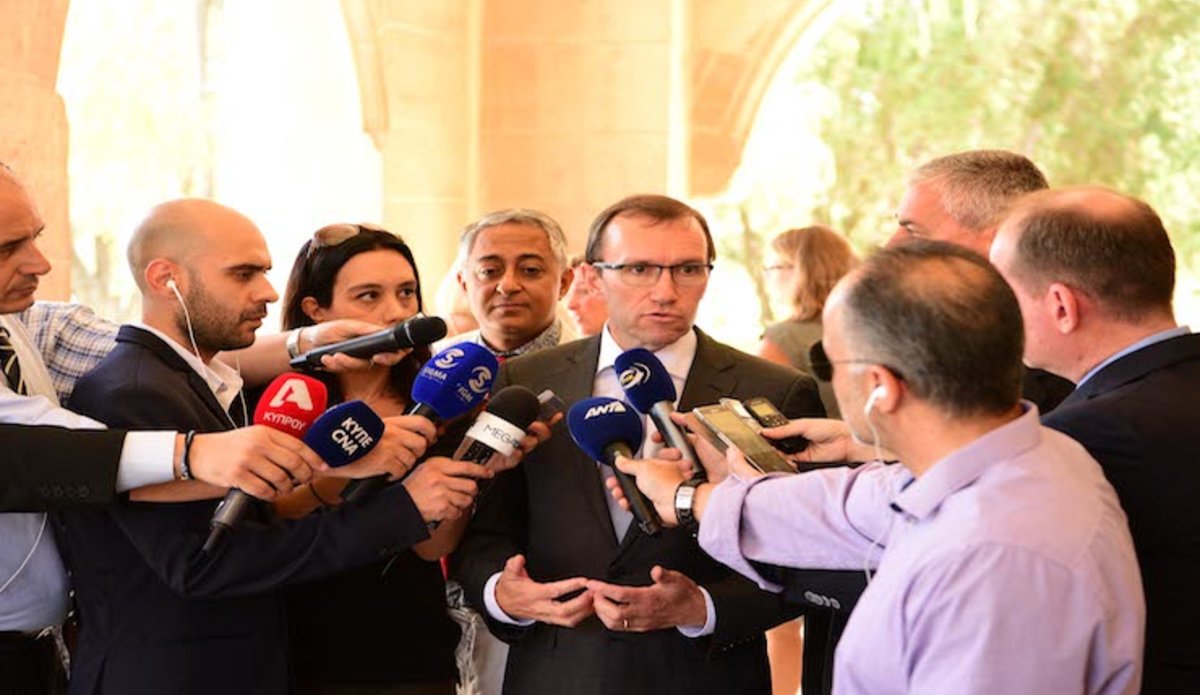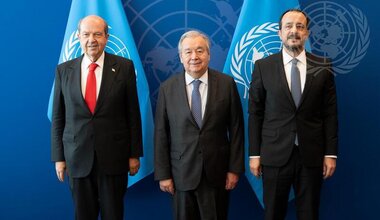Remarks by SASG Eide following his meeting with the Greek Cypriot leader, Mr. Nicos Anastasiades
NICOSIA, 16 June 2017 - The Special Adviser of the Secretary-General (SASG) on Cyprus, Mr. Espen Barth Eide, met today with the Greek Cypriot leader, Mr. Nicos Anastasiades, in Nicosia. SASG Eide met with the Turkish Cypriot leader, Mr. Mustafa Akıncı, on 15 June 2017.
Speaking to the media following the meeting, Mr. Eide said: “I just had an excellent meeting with Mr. Anastasiades; yesterday I met with Mr. Akinci, so we now have had thorough discussions with both leaders on the reconvening of the Conference in 12 days, on the 28th [of June].
I can now break the news about where we will be: we will be in Crans Montana; it’s on the other side of the Geneva Lake, up in the mountains in a nice, secluded spot… I have informed both leaders about the practical arrangements around this, which they appreciated, and I would also like to say that in addition to the work we do from the UN, the Swiss Government is also extremely helpful in technical preparations and in providing these facilities. Crans Montana is not in Geneva town, it’s in Crans Montana, which is in the region but on the other side of the Lake.
12 days to go. This is really an historic opportunity; we all know that it’s going to be difficult – it’s going to be difficult when we are there in Crans Montana, it’s also going to be a lot of work that has to be done before we go there, because we don’t want to come there empty-handed, which is why we’re working on a document which will guide the discussions on the security and guarantees chapter, which is the chapter that has received less attention and which is now very important to highlight, but also of course preparations on the other issues, because there will be interdependent discussions on all outstanding issues.
Both sides have confirmed to me now that they go there with the ambition to solve the problem. We know that is not a given, we have to be honest about that – it’s not getting easier just because we go to Switzerland, but there is a determination and a willingness that I can register now, that we go with that ambition. What we can do is to prepare as well as possible for this to be a success, but of course, again, at the end of the day it’s up to the courage, the will, the determination and the leadership of the leaders, but also, at this point, of the guarantor states, because we will have Turkey, we will have Greece, we will have the United Kingdom there as full participants, and we will have the European Union as an interested party, an observer, as we had in the original Geneva conference.
How long will it take? We don’t know; we are facilitating this [in] such a way that it can last for weeks, but it doesn’t have to take weeks, it depends on the time needed, but we want to make sure that we have the chance to actually wrap up all the strategically important issues. If we succeed, there will still be work, and let me say that right away, it doesn’t mean that all work is over and we can go straight to a referendum, but the aim is to have a strategic understanding of all those issues that are potential deal breakers, so that the leaders can say, “this will happen, and here’s the list of tasks that we still have to do”.
You will ask what happens if it doesn’t work, and I’m not going to speculate on that because we’re going there with the ambition to succeed. The Secretary-General and I will do everything we can to help make that a successful outcome – the decision, after all, is on the leaders and the guarantors.”
Answering a question on whether the negotiations will be carried out in parallel or whether progress must be made on the security and guarantees chapter, Mr. Eide reiterated part of the 4 June statement that followed the leaders’ meeting with the Secretary-General in NY:
“It [the statement] does spell out that they will happen in parallel – that’s clear. It also says that there is an agreement that the chapter on security and guarantees is highly important in order to arrive at a final settlement. So it highlights one chapter while it recognises that all chapters will be discussed.
The practical way of doing that is to do it in parallel, literally at separate tables, separate rooms; there will be ongoing discussions on all issues, but we have to separate them physically, because some of them pertain to the sides and the guarantors, and others are for the sides alone. So we’re having more or less a physical arrangement that reflects this principle agreement.
Of course, both sides will tell you that in order to do ‘B’, we need to see ‘A’, because what’s ‘A’ for one is ‘B’ for the other – if you see what I mean – so our task as the facilitator will make [it] possible to get to these final trade-offs, the final accommodations that require insights into other chapters. Is that easy? No, but I think it’s doable, and that’s what we’re discussing here now and what we will be discussing in the coming days.”
Responding to a question about whether there is a prerequisite for the document to be agreed by the sides, Mr. Eide said:
“Our commitment is clear that the document will exist, and we already, for some time now… literally immediately after New York, we started to collect inputs to this document, and we have made clear that we want all sides views to be represented, and we also are presenting a structured way of discussing these issues. Of course, all sides also are adamant to tell me that they are not going to do their negotiations before the negotiations, so we’re not preparing an ‘outcome document’. I say ‘outcome document’ because in more traditional negotiations between states, you’re preparing a draft text and then you go to see if you agree. That’s not possible here; nobody actually wants that, because that would mean you’re not negotiating in Switzerland, but you’re doing it before, but we want it to be a document that is helpful to try to let’s say, [unclear] into the various elements of an issue which traditionally has been very difficult to touch because the starting points have been quite opposed. We have ideas which we are dealing with – I cannot spell them out here yet because we’re still in the process, but I’m quite optimistic, and I don’t think the document is going to be an impediment to start negotiations; I hope that it will be helpful to make them successful.”
 UN
UN






